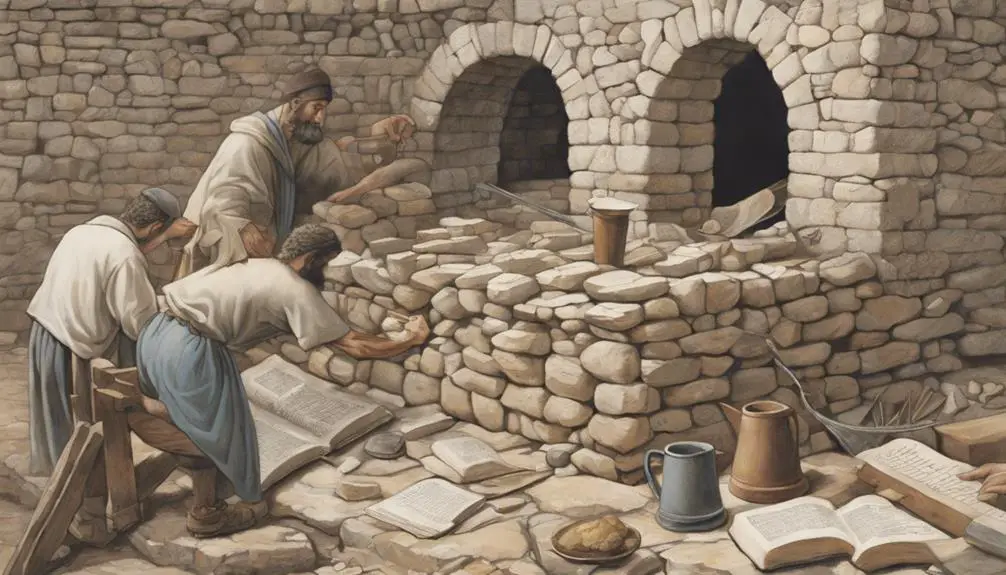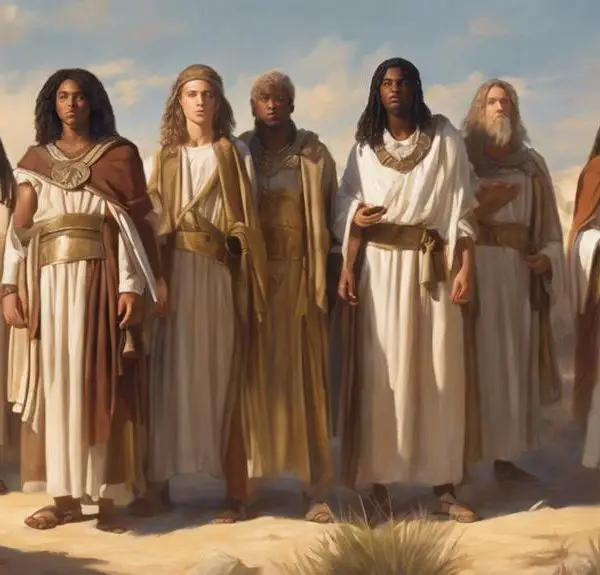Navigate through biblical narratives to discover history's most profound spiritual revivals, seeing how they transformed lives and societies.

List of Revivals in the Bible
Like a miner sifting for gold, let's explore the rich veins of spiritual revivals found within the pages of the Bible.
From the Great Awakening of King Josiah to the Pentecost in the New Testament, these stories of renewal and transformation are not only historically significant, but also deeply personal. They reveal God's ability to ignite hearts and catalyze sweeping change.
So, are you ready to journey across time, cultures, and narratives to unearth these powerful instances of revival? The thrilling exploration awaits you.
Key Takeaways
- The Bible records significant revivals led by figures like King Josiah, King Hezekiah, Jonah, Ezra, and Nehemiah.
- These revivals often involved a spiritual awakening, repentance, and societal transformation.
- Key actions in revivals included removal of false practices, rediscovery of God's laws, and symbolic covenant renewals.
- The New Testament revival at Pentecost marked the birth of the Church, empowered by the Holy Spirit for evangelism and growth.
The Great Awakening of King Josiah

In the midst of a spiritually dark period in Judah's history, King Josiah experienced a profound spiritual awakening that brought about significant religious reforms. This event, termed as Josiah's Reformation, not only altered the religious landscape of Judah, but also reshaped its political and social structures.
Josiah's Reformation was a definitive moment that stemmed from his personal transformation. You see, it wasn't a superficial, surface-level change but a deep, heart-level conviction that triggered a nationwide revival. Josiah's newfound dedication to the true worship of God resulted in the removal of idols and false religious practices, reinstating the centrality of the Temple in Jerusalem.
The impact of this Biblical revival was far-reaching. It brought about a renewed commitment to the law of God, as seen in the Book of the Covenant's rediscovery and the national covenant renewal. This translated into a heightened moral standard and a more just society.
In essence, the Biblical Revivals Impact was transformative, bringing about a significant shift in the spiritual and societal norms of Judah. King Josiah's revival, thus, serves as a potent reminder that even in the darkest times, a sincere turning back to God can spark a sweeping change.
Jonah's Revival in Nineveh

While King Josiah's revival dramatically reshaped Judah, there's another compelling biblical example of spiritual awakening – the revival that occurred in Nineveh through the prophet Jonah. This revival wasn't smooth sailing though, marked by Jonah's initial reluctance. He ran from God's call, fearing the wicked city wouldn't heed his warning. Yet, God had other plans.
God's intervention, Jonah's eventual obedience, and Nineveh's astonishing transformation are key. The city listened, repented, and turned from their wicked ways. This swift transformation, triggered by Jonah's reluctant prophecy, was nothing short of miraculous. They didn't merely change their actions but their hearts as well.
Here's an overview:
Factor |
Role |
Outcome |
|---|---|---|
Jonah's Reluctance |
Initially ran from God's call |
God intervened, Jonah obeyed |
Prophet's Warning |
Conveyed God's impending judgement |
Nineveh listened, repented |
Nineveh's Transformation |
City turned from wicked ways |
God's mercy prevailed, city spared |
Ezra and Nehemiah's Restoration

Shifting our focus to Ezra and Nehemiah, we see another significant biblical revival, one that underscores the power of faithful leadership in restoring spiritual vitality. The restoration led by these two men wasn't only physical but deeply spiritual in essence.
Ezra's leadership was characterized by his deep commitment to the Word of God. He didn't just read the Law to the people; he translated and explained it, making sure they understood. Nehemiah's courage, on the other hand, was his defining trait. Despite opposition, he remained committed to rebuilding Jerusalem's walls.
To fully grasp the significance of their roles, consider these aspects:
- Ezra's dedication to teach God's Law, showing a deep respect for divine instruction.
- Nehemiah's fearless approach in the face of adversity.
- The profound impact of their leadership on the people, leading to a spiritual revival.
- The unity and cooperation among the Jews during this restoration.
- How their actions laid a solid foundation for the coming of the Messiah.
King Hezekiah's Spiritual Renewal

Just as Ezra and Nehemiah led a spiritual revival through their exemplary leadership, King Hezekiah too, sparked a profound spiritual renewal in his kingdom. Hezekiah's faith was at the core of his reign, and it's this unwavering commitment to his beliefs that initiated a period of religious reawakening.
You'll find that Hezekiah's first act was a sweeping Temple cleansing. He removed the idols and restored the Temple to its original purpose. This wasn't just about physical purity; it was a symbolic gesture that demonstrated his commitment to monotheism and his rejection of idolatry.
His actions were underpinned by a deep conviction that his kingdom had strayed from the path of righteousness. Hezekiah's faith underpinned his actions, driving him to restore a religious order that was in line with the divine commandments.
He didn't stop at Temple cleansing. He also reinstated the Passover, a significant event that hadn't been properly observed for years. This restoration symbolized a renewal of the covenant between God and His people, indicating Hezekiah's intention to align his kingdom with God's will.
King Hezekiah's spiritual renewal was a testament to his faith, showing how influential one leader's conviction can be in fostering a spiritual revival.
Pentecost: The New Testament Revival

In the New Testament, the event of Pentecost marks a significant spiritual revival, dramatically changing the lives of the early Christians and shaping the course of Christian history. Occurring 50 days after the resurrection of Jesus Christ, it's a vital turning point in the narrative of the Bible.
Pentecost is significant for several reasons:
- It signifies the 'Birth of the Church'. The Holy Spirit descended upon the followers of Jesus, effectively establishing the Christian Church.
- It's when the 'Gift of Tongues' was first received. The apostles began to speak in foreign languages they didn't know, enabling them to spread the gospel far and wide.
- It marked the fulfillment of Jesus' promise to send a helper, the Holy Spirit, to his disciples.
- It demonstrated God's power and presence in a tangible way, strengthening the faith of the early believers.
- It set the stage for the rapid growth of Christianity, paving the way for its spread throughout the world.
You'll find this event in Acts 2, and it's a powerful reminder of God's continued work in the world, even after Christ's resurrection.
Frequently Asked Questions
What Is the Concept of Revival in the Context of the Bible?
In the Bible, revival's a concept symbolizing spiritual awakening and renewal. You'll often see it when people turn from sin to righteousness. It's not just about individual transformation, but societal change too.
Biblical interpretations of revivals show God's power to restore faith and fervor in His people. It's a powerful symbol of hope and rebirth.
How Are These Biblical Revivals Relevant to Modern Christian Faith?
Biblical revivals, deeply impactful for your personal faith, provide a blueprint for spiritual renewal. For modern Christianity, they serve as powerful reminders that God can awaken his people, spark transformations, and ignite spiritual growth. They're not just historical events, but ongoing possibilities.
They teach you resilience, hope, and the power of prayer, making them highly relevant to your faith journey today.
How Did the Revivals Influence the Social and Political Landscapes of Their Time?
You're curious about how revival impacts shaped political shifts of the time, right?
Well, these revivals often led to significant societal and political changes. They'd challenge the status quo, sparking reforms and revolutions. Some even led to the establishment of new laws and institutions. They weren't just religious awakenings, but catalysts for change, reshaping the social and political landscapes considerably.
Are There Any Other Significant Revivals in the Bible That Are Not Mentioned in This List?
You're asking about any additional significant revivals in the Bible not mentioned previously. There are indeed others.
The durations of these revivals vary greatly, as do the roles played by prophets. For instance, consider the revival under Prophet Joel or Prophet Jonah's revival in Nineveh.
These are just a few examples of unmentioned revivals that had profound influence on their societies.
How Do These Revivals Demonstrate the Power and Mercy of God According to the Bible?
These revivals demonstrate God's power and mercy as they often occur during times of spiritual decline or crisis.
You see, revival's spiritual impact is profound – transforming individuals and communities.
It's a divine intervention in revivals, showing that God isn't just a spectator, but actively involved in human affairs.
He's merciful, giving people opportunities for repentance and renewal.
Ultimately, these revivals highlight God's patient, persistent pursuit of His people.
Conclusion
You've journeyed through significant revivals in the Bible, from King Josiah's awakening to the New Testament revival at Pentecost. These stories show God's desire for spiritual renewal, a common thread woven through the Old and New Testaments.
They're not merely historical events, but timeless reminders of God's transformative power. Reflect on them, and you may find yourself inspired to seek your own spiritual revival.
Remember, God's call to renewal is as relevant today as it was then.



Sign up